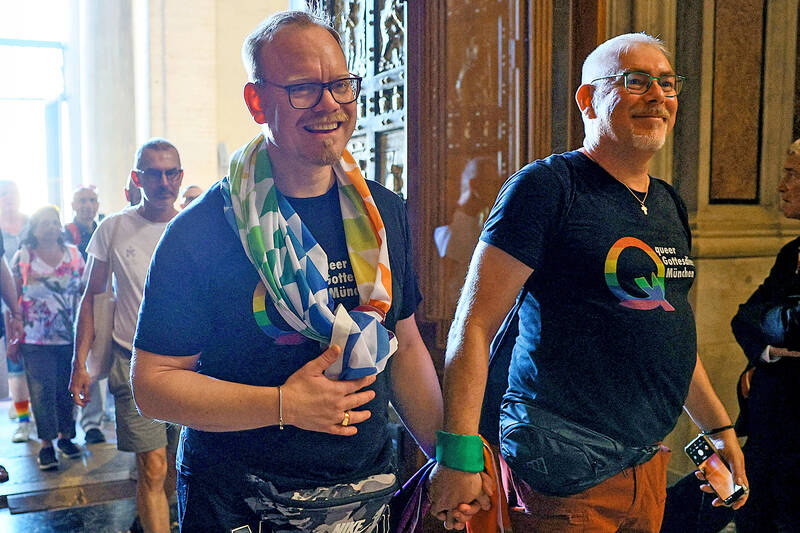In a first for the Vatican, more than a thousand LGBTQ+ Catholics and their supporters at the weekend held a pilgrimage, in what they were promoting as an important sign of diversity in the Catholic Church.
The gathering of about 1,400 people from around 20 countries was part of the Catholic Church’s Jubilee holy year. It was organized by La Tenda di Gionata (The Tent of Jonathon), an Italian association lobbying for greater inclusivity among the faithful.
While those taking part did not have a private audience scheduled with Pope Leo XIV, this was the first time such a pilgrimage has featured on the official Jubilee program, although LGBTQ+ groups have gone to the Vatican before.

Photo: Reuters
Yveline Behets, a 68-year-old transgender woman from Brussels, walked 130km with 30 LGBTQ+ people along part of the ancient Via Francigena pilgrimage route to get to Rome.
She said she expected more “plurality” from the church after experiencing difficulties with other Catholics, among whom, she said, she did “not always feel acknowledged.”
“One should not misuse the word ‘welcome.’ We are not just some outsiders who are welcomed sometimes, or more regularly — we are part of the same family,” she said, wearing a T-shirt with the rainbow of the LGBTQ+ community.
Just as millions of other pilgrims have done before, those who took part in Saturday’s LGBTQ+ pilgrimage walked up the main road to the Vatican. Carrying a cross in rainbow colors before them, they stepped through the Holy Door into St Peter’s Basilica.
Hugo, a 35-year-old from Quebec who declined to give his last name, said he believed the LGBTQ+ pilgrimage was “a really important signal for us to feel more included.”
He said he hoped it would “let people who are on the fence to allow themselves to be more welcoming towards homosexuals in the church.”
However, in a religious institution that for two millennia has viewed homosexual acts as going against its tenet of procreative sex and gay couples “intrinsically disordered,” the road to acceptance is still long.
“There are fears and a sort of misunderstanding when it comes to the life that homosexuals lead,” Hugo said. “If everybody got to know everyone else, I think a lot of barriers would come down.”
Currently “a lot of obstacles remain,” especially for couples who want the church’s blessing for same-sex marriages, he said.
Pope Francis, who died in April, had sought to make the Catholic Church open to all, and he made many overtures to the LGBTQ+ community — without changing the doctrine.
His 2023 decision to allow priests to bless same-sex couples triggered fierce opposition from conservative branches of the church, particularly in Africa.
His successor, Pope Leo XIV, has said that marriage is a union between a man and a woman, but he would not change Francis’ decision.
Beatrice Sarti, an Italian accompanying her gay son on the weekend pilgrimage, said there “is still a long way to go,” starting with shifting mindsets among Catholics.
“Many of our children no longer go to church... Because they are made to feel that they are wrong,” said the 60-year-old from Bologna, Italy, who is a member of La Tenda di Gionata. “That absolutely needs to change.”
“The first thing to do is train educators, the seminarians, the priests and the bishops, starting at grassroots,” she said, adding that “it is a very long process.”

A feud has broken out between the top leaders of the far-right Alternative for Germany (AfD) party on whether to maintain close ties with Russia. The AfD leader Alice Weidel this week slammed planned visits to Russia by some party lawmakers, while coleader Tino Chrupalla voiced a defense of Russian President Vladimir Putin. The unusual split comes at a time when mainstream politicians have accused the anti-immigration AfD of acting as stooges for the Kremlin and even spying for Russia. The row has also erupted in a year in which the AfD is flying high, often polling above the record 20 percent it

Ecuadorans are today to vote on whether to allow the return of foreign military bases and the drafting of a new constitution that could give the country’s president more power. Voters are to decide on the presence of foreign military bases, which have been banned on Ecuadoran soil since 2008. A “yes” vote would likely bring the return of the US military to the Manta air base on the Pacific coast — once a hub for US anti-drug operations. Other questions concern ending public funding for political parties, reducing the number of lawmakers and creating an elected body that would

The latest batch from convicted sex offender Jeffrey Epstein’s e-mails illustrates the extraordinary scope of his contacts with powerful people, ranging from a top Trump adviser to Britain’s ex-prince Andrew. The US House of Representatives is expected to vote this week on trying to force release of evidence gathered on Epstein by law enforcement over the years — including the identities of the men suspected of participating in his alleged sex trafficking ring. However, a slew of e-mails released this week have already opened new windows to the extent of Epstein’s network. These include multiple references to US President Donald

CHARGES: The former president, who maintains his innocence, was sentenced to 27 years and three months in prison for a failed coup bid, as well as an assassination plot Far-right former Brazilian president Jair Bolsonaro is running out of options to avoid prison, after judges on Friday rejected his appeal against a 27-year sentence for a botched coup bid. Bolsonaro lost the 2022 elections and was convicted in September for his efforts to prevent Brazlian President Luiz Inacio Lula da Silva from taking power after the polls. Prosecutors said the scheme — which included plans to assassinate Lula and a top Brazilian Supreme Court judge — failed only due to a lack of support from military top brass. A panel of Supreme Court judges weighing Bolsonaro’s appeal all voted to uphold